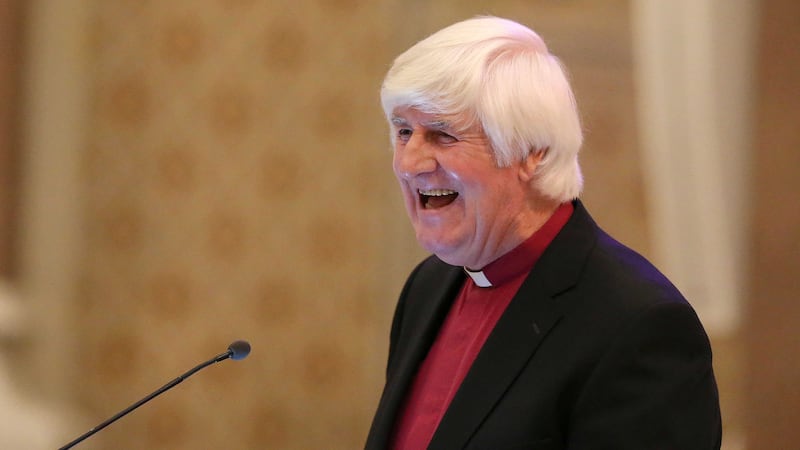A FEW minutes after I bought the Reverend Ken Newell’s book, Captured by a Vision – a Memoir I sat at the back of Clonard Monastery and read the introduction.
I did so because I knew that Clonard Monastery played a huge part in Reverend Newell’s life as did the peace makers, who were based there, Fr Gerry Reynolds and Fr Alec Reid.
It was there in the early 1990s with other republicans like Gerry Adams, Tom Hartley and Alex Maskey that I first met Rev Newell and other Presbyterian ministers.
Back then those meeting in the parlours of Clonard Monastery did not know it but they were planting the seeds of the peace process which would, within a few short years, transform the politics of this island and the lives of the people.
This book is written from the heart by a man with a very sharp and rugged intellect with God at the centre of his existence, steering him on his chosen path.
His life is based on scripture with Jesus Christ as the “supreme peacemaker” and Christ’s ‘Nazareth Manifesto’ providing him with a well of ideas from which he drew to progressively face the challenges of the modern and conflicted world of faith and politics.
And it is faith and politics in that order which are reflected in this memorable memoir. Ken Newell writes: “I cannot remember a time when faith and politics were not in some form interwoven in my psyche.”
Woven into his life, and this is also regularly reflected in the book, is his reliance on advice from his wife Val and the devotion of his mother Evelyn.
Of Val he said it was a “team effort in the family home, in the church, in making peace”.
He is critical of the institutional churches in Ireland for failing to embrace the vocation of peace making that lies at the “centre of the messianic mission of Christ” while he emphasises the role played by Christian peacemakers in church pews, largely overlooked yet without whom peace at the level of the street might have been more precarious.
Ken Newell’s mission of peace, reconciliation and ecumenism was given a structured purpose, energy and direction when he helped to set up the Clonard-Fitzroy Fellowship in 1976.
This brought together the congregations of Clonard Monastery in west Belfast and Fitzroy Presbyterian Church in south Belfast and in time brought together Fr Reynolds, Fr Reid and Ken Newell – a powerful trio on a mission of peace and reconciliation.
It is clear from the memoir that Ken Newell has a restless, probing and inquisitive mind that does not settle easily whatever the circumstances he finds himself in.
His Orange Order background (his father was a member as was his grandfather and great grandfather) led him to become an Orange Order chaplain in 1965 for a short period - a step which was consistent with what he described as his ‘anti-Catholic belief system’.
A system which restricted him. He was 25 before he ‘set foot in a Catholic church’.
Old loyalties, family and community were holding him back but his mind was keen to explore new horizons.
And new horizons beckoned in 1970 when he was asked to go to Timor, Indonesia to join a theological college.
His three years in Timor changed him. He returned to Belfast, “more fully part of the world-wide family…and the diverse church of Christ”.
This notion of belonging to a world-wide church was to lead him into a protracted and tough struggle in the late 1970s inside the Presbyterian Church of Ireland over its membership of the World Council of Churches which was heavily involved in humanitarian aid to organisations struggling to end white rule in many countries in Africa.
The Presbyterian Church of Ireland wanted to leave and Ken Newell argued to stay.
The Swiss psychologist Carl Jung said, “the meeting of two personalities is like the contact of two chemical substances: if there is any reaction both are transformed”.
I think that is a fair description of Ken’s influence on those he met in his journey through life as an ecumenist, a reconciler, a church builder and most important of all a peacemaker.








